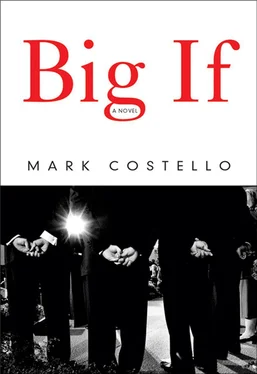Jens drove out to the house for dinner around then, just after he went to work at BigIf. Walter was alive, presiding at the table, and Evelyn was there, fussing over Peta, who was pregnant, and Walter asked about BigIf, and Jens explained the vision of a Web-based war game, of how they would build it, the overall design.
Walter said, “A war game?”
Jens explained about the monsters, how kids would pay to kill them in the game, the old joystick thrill of killing.
And Jens saw it on his father’s face, a cloud of disapproval. Jens saw and felt his father’s disapproval over the last months of Walter’s life. Mostly Walter kept his peace, said nothing, no lying praise but not criticisms either, and Jens, sensing this, had to pick a fight.
“What’s wrong with my game?” he asked his father one night at the house. “What’s wrong with being a success?”
Walter didn’t want to fight with his son — he wanted anything but that — and so he said, “Your game is immoral, Jens. Worse, it’s amoral. It’s a waste of your gifts. You must quit right now.”
“Why?” said Jens. “To satisfy your idea of purity?”
“No,” said Walter. “You have to quit because you’ll be unhappy if you don’t.”
Jens felt judged and maybe he was. He went into a kind of sulk and didn’t call or speak to Walter for a week, which was a long time for Jens and his father to go without speaking. When Walter called Jens, they talked about the weather, or whatever, Jens did not remember, and two weeks later Walter died of heart attack, leaving the question of the judgment unresolved.
Vi came back from Washington the summer after Walter’s death. She was working as a bodyguard by then, and had come through something terrible, a bungled operation (a flood, a shooting — she didn’t want to talk about it), and Jens was glad to have her home, to see her face. Vi would understand, he’d thought, she saw the things I saw, the paper train derailed, the farmhand with one foot, the losses calculated by their father. She’d known the man as Jens had known the man, and she would understand. But the Vi who came home that weekend was not his little sister, not the sister he remembered anyway. She was thin, too thin, and her eyes were vacant, gray and scary-vacant, and she seemed to scan everything, passing cars, strangers on the street, with the same alert indifference. Jens too — she scanned him like another stranger on the street. He thought at first that this was some kind of Secret Service thing, but then he realized, No — she’s judging me like Walter did, and what I’m seeing in her eyes is disapproval.
Jens walked back to the car, thinking of the last time he saw his sister, a misbegotten birthday picnic in the yard, and how they fought and shouted, Jens and Vi, and how Peta had stepped in to play peacemaker, Jens! Vi! , shouting at them to stop shouting, and how Kai, seeing the adults shouting, had started shouting too, thinking they were playing a new fun shouting game.
Jens sat in his car for a long time, looking at the house. They kept the place half furnished and the water off. Peta said that it showed bigger half furnished, as opposed to fully furnished — it was just a rule of space, the way it showed. She also said that you never showed a house un furnished if you could avoid it — made the place seem lonely and forlorn, buyers caught the scent of desperation and tried to low-ball you. It was better to make them think that you were parting with reluctance.
He called Peta at the office to apologize for his mean crack over breakfast, his little imitation of her, the moon at night . He wanted to apologize because he loved his wife. He loved her most, or showed it best, when she was somewhere else, not right in front of him, getting on his nerves. Claus picked up on the second ring.
“I’m sorry, Jens, she’s at a showing,” Claus reported, pronouncing Jens’ name as Yenz. “Is there any message?”
“No,” said Jens. “I’m at the house, by the way. It looks fine. Any offers on it yet?”
Claus said, “The house?” They were selling many houses at Moss Properties.
“My father’s place,” said Jens. “Santasket Road.”
“Oh yes. Offers? No — no offers yet, but spring will be a better time, I’m sure.”
Jens liked to start his working day in the balconyabove the server ring, watching the big gas-plasma screen, the central game-state monitor, and the smaller VDTs around it, walls of ever-changing data (current player loads, loads projected, lag time at the modem farm, kill-rate curves plotted and projected), the resting pulse rate of the network. The seats and woodwork in the balcony had come from a movie palace in Chicago. BigIf had bought the interior when the palace was demolished and reinstalled it above the servers, a retro-reference and a gag. Jens, communing here each morning, often saw journalists and prospective venture funders coming through on carefully led tours with Reese and Reed, the twins from marketing. Today there were no tours, just six or seven slacker kids lounging in the ring, mousing around screens, feet up on their tables, keyboards in their laps. Digby, the sysop and top slacker, was conferring in the corner with Meredith Shattuck, the deputy chief technology officer, and bald Jerzy Czoll, the president and CEO. Digby did hardware and Meredith did everything, but Jerzy was more your salesman-sloganeer, the Hamsterman of deals, and he rarely got this close to the actual machines. Being close to this much logic seemed to make Jerzy nervous.
The big screen was a camera on the game, looking down, seeing all, like God or the Goodyear Blimp. Players from around the world paid a hefty monthly-and-per-minute fee to ride their browsers to BigIf, passing through the logon buffer, selecting a version of themselves from careening menus (a smorgasbord of age, race, gender, and weapon options), descending finally through trippy bluish screens to the universal starting point, a deep smoking crater formerly known as downtown Albuquerque. The object of the game was to travel safely west on foot from Albuquerque, crossing a thousand simulated miles of handsome, high-def post-apocalyptic wastes, Martian basins, mountain ranges, canyonlands, and creepy overlush forests, a trek complete with place-specific audio (three different types of footsteps — boots on rock, boots on road, boots on dirt or sand, the rush of streams, falling rain, the distant sunset cries of grazing mutant beasts), and emerge alive on the sparkling gigabyte Pacific.
Figures moved across the screen like ants, west along the interstate or north into the mountains. Digby zoomed in with his joystick, explaining some hardware glitch to Meredith and Jerzy. The figures moving on the screen were boxy and stiff-legged, with flat immobile faces. Some were human, paying customers; some were simulated humans, software bots, the helpers and the holy men, the monsters in hunt mode. The helper bots acted as guides, innkeepers, rent-a-cop bodyguards, roadside pop-up merchants selling the necessities: food, water, armor, weaponry. The holy men, the wizard monks and holy village fools, posed rhyming riddles, seven in a cycle refreshed weekly, leading players to shrines and oracles. There were initially nine shrines hidden in the desert, three branded, six generic, later upgraded to twenty-three.
When Jens came here the first time, the game was in design and the screens were still in packing crates. Over the next few months, Jens and Vaughn Naubek, another coder, wrote the logic kernel, the software brain and navigation tools for the helper bots, working with specs from the head creative, BigIf’s chief imagineer. Head demanded wizards and sent Jens a sketch of a Tolkienish creation like Walt Whitman only not as macho. The drawing had been done by Phoebe Rosenthal, the artist on the payroll (a painter of real talent, who doodled bots to support her serious work). Jens and Vaughn Naubek took the fey Walt Whitman and built a brain, a hundred lines of source and ten function calls, a good, tight piece of problem-solving, well within the memory budget for the bot. The wizards were programmed to stay in one place, a plot in the Cartesian X, Y, Z, until addressed by a human player, then nod and move toward their assigned shrine. The wizards scanned every third human second for any player within five distance tiles. If a wizard found no humans in his scan, he returned to his starting tile and waited for the next scheduled scan and the next customer. In a person, say in Walter, this pattern of behavior might be described in moral terms (stoic, faithful, dutiful), but in Jens’ system it was algorithmic: new plot X 2, Y 2equals X plus one, Y plus one, and the bot is driven to the virtual northeast. Algorithms were, as Walter had said, relentlessly amoral: the wizards scanned and moved because they were programmed to, and for no other reason.
Читать дальше












